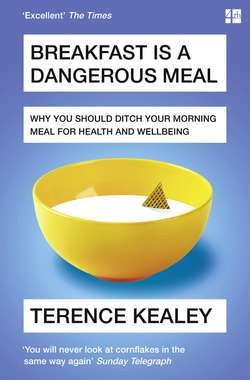Читать книгу Breakfast is a Dangerous Meal: Why You Should Ditch Your Morning Meal For Health and Wellbeing - Terence Kealey, Terence Kealey - Страница 27
Why were Dr Farshchi’s subjects anomalous?
ОглавлениеWhy were Dr Farshchi’s breakfast eaters eating less, overall, than the breakfast skippers? Or, to rephrase the question, why were the breakfast skippers eating more, overall, than the breakfast eaters?
Well, Dr Farshchi studied only ten women, whom we have to conclude were simply unrepresentative of the wider population. Different people can respond dramatically differently to the same food. Consider blood glucose. In 2015 two Israeli scientists published a comprehensive study on no fewer than 800 people, finding that ‘people eating identical meals present high variability in post-meal blood glucose responses.’11
Consider bread. There is a ninefold difference between different people’s blood sugar responses to breakfast bread, with some people registering only a pimple on the graph while others register a huge rise. Some people, remarkably, register higher levels of blood glucose after eating bread than after eating the equivalent amount of glucose itself. In some people, moreover, bananas raise blood glucose levels worryingly but cookies are completely safe, yet for other people the exact reverse is true. And for some people tomatoes are dangerous.
These variabilities should not have been surprising: in a classic experiment from 1990, a Quebec study isolated twelve pairs of young male twins, and for four months overfed all twenty-four men by 1,000 calories a day, almost as if they were geese on a pâté de fois gras production line. On average, the men gained 8.1 kg (18 pounds or 1¼ stones) but the range was considerable, from 4.3 kg to 13.3 kg.12 Intriguingly, though, each twin gained almost the same amount of weight as their fellow twin; i.e. different people’s metabolisms are very different indeed, and the differences are largely genetic.
People, in short, have inherited very different responses to food, so nutritional studies on only ten people will inevitably be overwhelmed by individuals’ quirks. Indeed, a later breakfast experiment by Dr Farshchi’s colleagues in Nottingham on twelve men found that the ‘combined energy intake [breakfast and lunch] did not differ between the breakfast and no-breakfast trials’,13 i.e., when those Nottingham scientists repeated their own experiment on twelve men, they got different results from when they’d performed it on ten women – with both sets of findings being at variance with previous studies. To get a solid breakfast finding, therefore, it may not be necessary to study 800 folk the way Segal and Elinav did, but equally we must view findings on ten or twelve subjects as only preliminary and potentially misleading, not definitive.
It was scrupulously honest of Dr Farshchi to admit to the anomalous nature of his experiment, but it is nonetheless depressing that his paper has been cited over 200 times (including by the Harvard scientists), and though I’ve not checked every paper that has cited it, every one I have checked has cited it to confirm a breakfast hypothesis that the data in the paper actually disprove. Dismaying.
